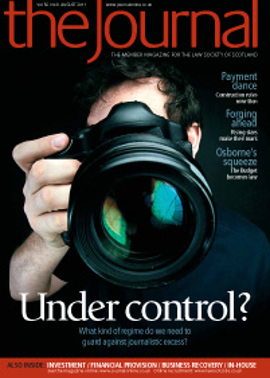Shared concerns

The Dunblane shootings took place just three months before I became the procurator fiscal in Stirling – 15 years on, my memories of the shock and horror felt remain as vivid as ever. Those who experienced the murders in Norway last month will now be feeling the same emotions of loss and grief. In reality, the events in Oslo and Utoya Island eclipse all else I have to report and I have written to the president of the Norwegian Bar Association to express our sadness and pass on the sympathies of Scottish solicitors to the country’s 6,500 lawyers and their families.
Back to Scotland
At the start of July, I attended the opening of the fourth session of the Scottish Parliament by the Queen. Although the Parliament went into recess the following day, we look forward to offering constructive input to the new legislative programme when MSPs reconvene after the summer, including the delayed anti-sectarianism bill. The Government saw sense by listening to the Society, and others, who argued that the bill – simple in concept, but complicated in detail – required proper scrutiny. We await the continuation of its passage with interest. In more general terms, we hope that ministers exercise the caution we urged in our election manifesto by only legislating where necessary, while also ensuring that all legislation is effective.
The issue of access by suspects to legal advice continues to develop apace and remains a matter of major public concern. Rather than pre-empt any further developments, suffice to say we have robustly expressed our concerns about the interim scheme to the Scottish Government and the Scottish Legal Aid Board, emphasising the issues around subsumption of fees and access to a solicitor of choice. We have made it clear that it is for solicitors to decide how best to advise their clients, and also stressed that solicitors should be properly remunerated for participating in the scheme. Our relations with Government remain good and we will continue to work hard on behalf of the profession to help develop a system that is workable and effective. Practitioners will continue to receive regular updates as events unfold. Finally, a word of thanks to members of both our negotiating teams. They put in long hours and perform a difficult job in support of their colleagues in legal aid work. The Society owes a debt of gratitude for their hard work and dedication.
Raising our game
A huge amount of work has also gone into overhauling the regime for qualification as a solicitor. The introduction of the new Foundation Programme and Professional Education and Training (PEAT) regime takes effect on 1 September, and I want to pay tribute to the efforts of those within the Society’s executive who have implemented this project over the past four years. That process has included holding one of the largest consultation exercises we have yet undertaken, and the accreditation of PEAT 1 (Diploma stage) and trainee CPD providers. Well done to all.
The new pre-qualification regime is hugely significant, not just for law students, trainee solicitors and their employers, but also because it embodies principles that are equally relevant to professional development after qualification: defined learning outcomes; planning, monitoring and demonstrating personal development; emphasis on communication, business and other non-legal skills alongside legal knowledge; prioritising ethical awareness; integration between working and learning; flexibility and variety in provision; and so on. All this hard work on the pre-qualification regime will be wasted unless we carry these principles forward into the post-qualification regime. This is one of the next major projects for the Society’s executive.
No doubt a more challenging post-qualification regime will be required if Scottish solicitors are to continue to meet the expectations of clients, the public and Government, as well as match best practice in other professional sectors. There are already signs that, here in Scotland, we are up to the challenge. I recently met Lord Cullen and other directors of the WS Society’s innovative Signet Accreditation programme. It is an excellent example of an initiative that requires solicitors to demonstrate their expertise, through rigorous and objective assessment, not only in the technical aspects of a specific practice area, but equally in the communication, business and other non-legal skills that so often make all the difference as far as clients are concerned. While promoting specialisation, the programme also reflects the idea that a common professional core and transferable skills are part of the modern Scottish solicitor. I am convinced we will need more of this type of programme if we are to take post-qualification professional development seriously in the modern world. Signet Accreditation is available now and I commend it to our members.
Another recommendation for members – the Society is making arrangements for a tour of faculties around the country. Look out for more details in your area.
In this issue
- Take five
- Shared concerns
- Fairness in repossession
- The price of freedom
- Next month: your new look Journal
- A tale of two cities
- Ready money
- The longest arm of the law
- Return to normality?
- Ghost of decree past
- Shaping the world order
- Bright lights
- "One Profession" comes together
- From the Brussels office
- Ask Ash
- Give it a push start
- Up to the job?
- Spotlight on fairness
- Human rights abroad
- Heightened AWaReness
- Recipe for fudge
- My late father
- Getting closure
- Website review
- Book reviews
- Clearer view
- Rules of engagement






